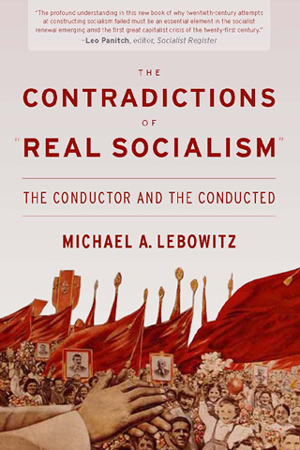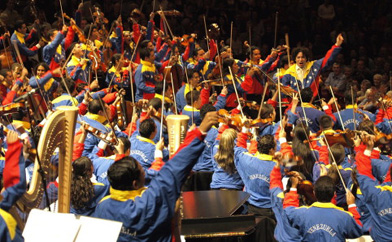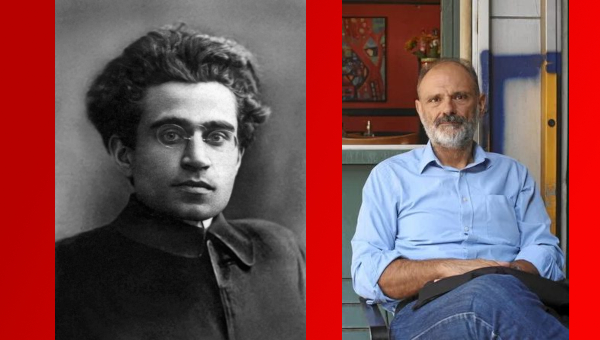Overture: The Conductor and the Conducted
The following is an excerpt from Michael Lebowitz’s new book, The Contradictions of “Real Socialism”: the Conductor and the Conducted, Monthly Review Press, 2012. It is posted with the kind permission of the author and Monthly Review Press.
Do we need leaders? Certainly, when we work together on a common project, we are more productive than when we are separate and isolated. The whole is greater than the sum of the parts taken individually. But do we need a director in order to work together on a common project?
A Directing Authority
 Within capitalist relations of production, a capitalist hires “individual, isolated” owners of labour-power, directs their cooperation and owns the products of their collective labour. As the owner of the result of their activity, he is the beneficiary of “the social productive power which arises from cooperation”; it is “a free gift” to that capitalist.[1] According to Karl Marx, though, direction in the process of cooperation is not unique to capitalism: “All directly social or communal labour on a large-scale requires, to a greater or lesser degree, a directing authority.” He offered two reasons: (a) “in order to secure a harmonious cooperation of the activities of individuals” and (b) “to perform the general functions that have their origin
Within capitalist relations of production, a capitalist hires “individual, isolated” owners of labour-power, directs their cooperation and owns the products of their collective labour. As the owner of the result of their activity, he is the beneficiary of “the social productive power which arises from cooperation”; it is “a free gift” to that capitalist.[1] According to Karl Marx, though, direction in the process of cooperation is not unique to capitalism: “All directly social or communal labour on a large-scale requires, to a greater or lesser degree, a directing authority.” He offered two reasons: (a) “in order to secure a harmonious cooperation of the activities of individuals” and (b) “to perform the general functions that have their origin
in the motion of the total productive organism, as distinguished from the motion of its separate organs.”[2]
According to Marx, in short, there is a general necessity for the “function of direction which arises out of the nature of the
communal labour process.” That general requirement, though, must not be confused with the particular content and form that it takes on within capitalism. After all, the essence of capitalist direction embodies capital’s drive to expand surplus value (thus the greatest possible exploitation of workers), the need to overcome the resistance of workers and the need to protect investments in the means of production. Accordingly, capitalist direction is inherently an antagonistic process, and it takes on “despotic” forms – a hierarchy of supervisors whose function is to police workers and command in the name of capital.[3]
But a despotic character of direction is not unique to capitalism. “In all modes of production that are based on opposition of the worker as direct producer and the proprietor of the means of production,” supervision and control of the producers is essential. Marx pointed to, for example, the supervision of slaves in the Roman Empire and also to “despotic states,” where “supervision and all-round intervention of the government” involves “the specific functions that arise from the opposition between the government and the mass of the people.”[4] In all such cases, direction is “twofold in content” – it is general and specific, both that aspect related to every socially combined labour process and also that specific aspect related to maintenance of the particular character of exploitation.[5]
Let us try, though, to separate these two aspects logically and to consider in itself the general side – that “work of supervision and management [that] necessarily arises where the direct production process takes the form of a socially combined process, and does not appear simply as the isolated labour of separate producers.” According to Marx, this combined labour in itself is enough to require a “directing authority”: “where many individuals cooperate,” he noted, “the interconnection and unity of the process is necessarily represented in a governing will, and in functions that concern not the detailed work but rather the workplace and its activity as the whole, as with the conductor of an orchestra.”[6] In a process of cooperation, someone must have responsibility for the whole, for “the total productive organism.”

For Marx, the orchestra conductor was a symbol of directing authority that is not based upon the division between producers and the owners of the means of production. The conductor does not lead the orchestra because he owns the means of production: “A musical conductor,” Marx writes, “need in no way be the owner of the instruments in his orchestra”; rather, his role as leader is the result of “the productive functions that all combined social labour assigns to particular individuals as their special work.”[7] In short, the orchestra conductor is necessary. “A single violin player is his own conductor; an orchestra requires a separate one.”[8]
The “special work” assigned to the orchestra conductor is to see the members of this orchestra as a whole rather than as a collection of separate players and to ensure that they function harmoniously and successfully as a unit in performing the predetermined score. Thus the conductor articulates the separate powers of the individual musicians into a collective power, where the whole is greater than the sum of its individual parts. But to secure that “harmonious cooperation” and to function as the agent of the whole, the conductor must be able to exercise authority over the individual members.
Does the conductor, then, have power over the members of the orchestra? For Elias Canetti, the conductor is the embodiment of power:
His eyes hold the whole orchestra. Every player feels that the conductor sees him personally, and still more, hears him. The voices of the instruments are opinions and convictions on which he keeps a close watch. He is omniscient, for, while the players have only their own parts in front of them, he has the whole score in his head, or on his desk. At any given moment he knows precisely what each player should be doing. His attention is everywhere at once, and it is to this that he owes a large part of his authority. He is inside the mind of every player. He knows not only what each should be doing, but also what he is doing. He is the living embodiment of law, both positive and negative. His hands decree and prohibit. His ears search out profanation.[9]
Truly, this is power: “Quite small movements are all he needs to wake this or that instrument to life or to silence it at will. He has the power of life and death over the voices of the instruments; one long silent will speak again at his command.” To be able to exercise that power, on the other hand, requires that the players accept those commands: “The willingness of its members to obey him makes it possible for the conductor to transform them into a unit, which he then embodies.”[10]
In this description of the orchestra, there is no room for spontaneity or improvisation.
Rather, the predetermined score must be followed. In this division of labour, each player has a precise assignment. By performing their assigned tasks with the regularity of a machine and by following the directives of the conductor, the orchestra as a whole achieves the result that exists ideally in the mind (or on the desk) of the conductor.
The ‘key link’: Human Development and Practice
But, as we noted earlier, there is always more than one product of human activity. When we grasp the “key link” of human development and practice, we understand that every labour process inside and outside the formal process of production has as its result a joint product – both the change in the object of labour and the change in the labourer herself.
If this is the case, then, we always need to ask not only about the success of a labour process in achieving a particular predetermined goal but also about the nature of the human beings and capacities produced within the process. When the capacities of workers grow through their activity, this is an essential investment in human beings. Accordingly, in my book The Socialist Alternative I argue that “socialist accountancy” and a concept of “socialist efficiency” must incorporate explicitly the effects upon human capacities of all activities.[11]
Marx explored this question at length in Capital – by demonstrating the negative effect upon
the capacities of workers of production under capitalist relations. He pointed out that under the direction of capital, the producers are subordinated to a plan drawn up by the capitalist, and their activity is subjected to his authority and purpose; the joint product that emerges from this particular social labour process separates thinking and doing, and its results must be entered as negative in any accounting system that values human development.[12]
This is what we need to keep clearly in mind when we think about socialism. Social
production organised by workers is a necessary condition for the full development of the producers; it is not something to be put off to some future society. “As long as workers are prevented from developing their capacities by combining thinking and doing in the workplace, they remain alienated and fragmented human beings whose enjoyment consists in possessing and consuming things.”[13] Once we grasp Marx’s insight into revolutionary practice, the importance of that key link of human development and practice, we recognise that the process of building socialism must be one of simultaneously producing new socialist human beings – that is, two products rather than one.
Return, though, to Marx’s metaphor for the general necessity for a directing authority
where many individuals cooperate – the orchestra conductor. Think about how that
particular conductor enforces the division of labour of the players (including
the separation of thinking and doing) in order for them to perform the predetermined
score as a harmonious unit; and think about what he rejects – spontaneous creation, collective interaction among the players, jazz.
The orchestra performs the music. But what is the joint product in this process? What development of human capacities occurs in this social labour process under
the direction of the orchestra conductor as described above? Certainly, this process is far more rewarding than isolated, individual activity: “When the worker co-operates in a planned way with others, he strips off the fetters of his individuality, and develops the capabilities of his species.”[14] Certainly, too, the members of the orchestra can take pride in their collective accomplishment.
But when they are working in accordance with the plan of another who stands over
and above them and are subjected to a strict division of labour, what the
collective worker achieves occurs at the expense of the individual member. As in the case of the division of labour that developed in manufacture, “the knowledge, judgement and will” otherwise exercised by an individual musician is now concentrated in this relation in the representative of the whole.[15] What individuals lose in this process is the opportunity to develop their own capacities by exercising their knowledge, judgment and will collectively.
 Compare this to a process in which the musicians listen to each other, engage in conversation and build upon the contributions of each other. That is a process in which the whole exceeds the sum of the parts taken individually and where the capacities of the producers expand through their practice. Leadership in such cases, to a greater or lesser extent, involves general guidance and the space for initiative from below; its joint product is demonstrated by the emergence of new leaders.
Compare this to a process in which the musicians listen to each other, engage in conversation and build upon the contributions of each other. That is a process in which the whole exceeds the sum of the parts taken individually and where the capacities of the producers expand through their practice. Leadership in such cases, to a greater or lesser extent, involves general guidance and the space for initiative from below; its joint product is demonstrated by the emergence of new leaders.
Serve the Music
Do we need leaders? There is a great difference between the recognition of the
importance of coordination, on the one hand, and the conclusion that leadership
is “the special work” assigned to particular individuals on the other. The first flows from understanding the benefits of social cooperation and is not specific to any form of coordination. The second involves a particular division of labour – a social relation in which the roles of conductor and conducted are fixed, and commands flow one way.
A general process of direction of combined labour is an abstraction. Coordination
always occurs “within and through a specific form of society,” and the example
of the orchestra conductor identified by Marx is one form (but only one form) of non-capitalist direction.[16] To demystify the nature of capital, it was sufficient for Marx to point to the orchestra conductor to demonstrate that capitalists as such are not necessary
as functionaries of production. That, however, does not mean that the relation
of conductor and conducted is the appropriate form of cooperation in the
society of associated producers.[17]
There are different forms of leadership and different goals. If people are produced through their activity within particular relations, the human products of a society divided into conductors and the conducted will be specific to that society. And how is such a society reproduced? Will those who receive commands from the conductor always need particular individuals who have the power to direct as their “special work”? And how are those who exercise power chosen and produced?
Consider the conductor. If we are to believe Canetti, the conductor does not seek power for personal gain or for the exercise of power itself. Rather, the music is “the only thing that counts … and no one is more convinced of this than the conductor himself.” To transform an assemblage of different people into a unit, to monitor all closely, to ensure that they all play their parts properly, to silence those who deviate from the plan – no one is more convinced than the conductor “that his business is to serve music and to interpret it faithfully.”[18] I am essential, he thinks – without me, there would be chaos.
Metaphors can be dangerous – they can illuminate for a moment but can never substitute for analysis.[19] To understand “real socialism,” we need to go beyond metaphor. •
Endnotes:
1.
Lebowitz, Beyond Capital, 84 – 87.
3.
Ibid., 1 449 – 50.
4.
Karl Marx, Capital, vol. 3 (New York: Vintage Books, 1981), 507 – 8.
5.
Ibid., 1:450.
6.
Ibid., 3:507.
7.
Ibid., 3:510 – 11.
8.
Ibid., 1:449.
9.
Elias Canetti, Crowds and Power (Middlesex: Penguin, 1973), 460.
10.
Ibid., 459.
11.
Lebowitz, The Socialist Alternative, 154 – 59.
12.
Marx, Capital, 1:450; Lebowitz, The Socialist Alternative, 156.
13.
Lebowitz, The Socialist Alternative, 86.
14.
Marx, Capital, 1:447.
15.
Ibid., 1:482.
16.
Marx, Grundrisse, 87.
17.
The manager in a cooperative factory paid by the workers (rather than representing capital to the workers) is another example he offered – one in which “the antithetical character of the supervisory work disappears.” Cooperative factories, indeed, provided the proof that the capitalist was “superfluous as a functionary in production.” Marx, Capital, 3:512, 510.
18.
Canetti, Crowds and Power, 458.
19.
This particular metaphor, too, can be the source of much disagreement among those who love classical music.





